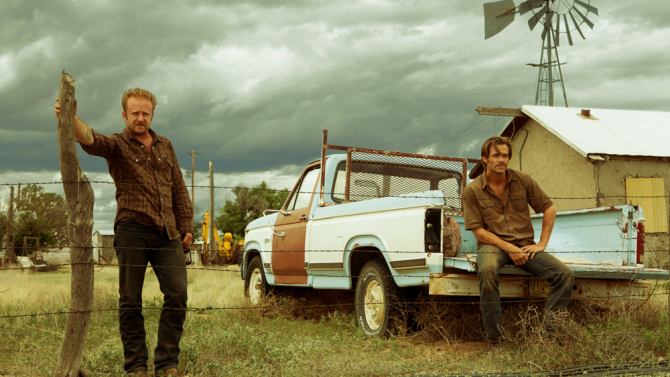Hell or High Water
Director: David Mackenzie
Film review by Brett Champion
It’s a well worn cliché that the heart, the ‘real’ content of a film, lies in the relationships between its characters, their interactions, and their by-plays.
Hell or High Water is the latest release for idiosyncratic director David MacKenzie, detailing the exploits of bank-robbing brothers Toby (Chris Pine) and Tanner (Ben Foster) as they seek to evade the clutches of cheerfully racist Ranger Marcus (Jeff Bridges) and his long suffering partner Alberto (Gil Birmingham). The film begins with little to no pre-amble as the audience is thrust right into the midst of the action, and immediately submerged in MacKenzie’s vision of West Texas. At first glance, this appears to be simply another Neo-Western rollick, entertaining certainly, but perhaps lacking in the nuance or depth to distinguish this film from the field of other modern spaghetti takes filled with stubbly, squinting men which seem to be released every other week. Fortunately however, this is most definitely not the case.
In the moments after the movie’s surprising, gripping opening, what strikes you is the inherent dichotomy present in the long, unhurried shots of the Texan landscape. The vast openness of the desolate plains is at odds with the decaying towns, oil derricks, and straggling fences that seem to perch in herds, clinging to the wild earth. In a strange way the sheer scope and openness of the movie’s setting is almost oppressive and claustrophobic as it reinforces the insignificance of the drama that plays out upon its vast stage.
But if the film is in danger of being overwhelmed by this atmosphere of melancholy, its saving grace is its sparkling wit. Hell or High Water possesses a genuine, seemingly incongruous warmth, often existing side by side with violent and emotionally intense subjects, a cavalier charm and cheeky grin that you can’t help but be seduced by. It’s this charm, more than setting or subject matter, that ties this film to its cinema heritage and places it amongst its contemporaries. MacKenzie draws deeply on the spirit of the irreverent western, evoking the joyful nihilism of films such as Butch Cassidy and The Sundance Kid or Shane, as well as the dark, ironic humour of modern classics like In Bruges or Snatch.
“it’s the wilderness, the introspective, the individuality that is the true essence, the soul of this film”
The scenery, the underlying societal angst, the idea of brotherly love are all concepts plumbed in depth by Hell or High Water. Long, unhurried conversations between Toby and Tanner or Marcus and Alberto provide an insight into the minds of these characters, their histories and struggles, and reflect upon the state of the external world MacKenzie portrays. But it’s the wilderness, the introspective, the individuality that is the true essence, the soul of this film. A fierce spirit, encapsulated in Toby, rails against the death of his American Dream, against a world where the banks are the Bad Guys, where “Fuck you” is only the sentence he can find to say “I love you” to his own brother. The strange bedfellows of utter despair and stubborn hope writ small through the quiet moments on screen provide a far greater and richer emotional depth than any amount of, admittedly excellent, snappy dialogue does.
This idea of individualistic reflection is perfectly demonstrated in the seemingly random encounter between the rangers and a group of cattle-hands, literal cowboys, herding their livestock down to the river to escape the fire pursuing them and sending plumes of billowing smoke dramatically into the air. “Should we call it in?” asks Alberto, clearly concerned. “Naw” replies Marcus laconically. “There’s no one out here to help them anyway”. And with that, the Rangers drive on their way, taking the story with them, and leaving the cowboys to continue their race to the river. In fact, throughout the film’s hour and 43 minute runtime, vignettes drift in and out the narrative, characters whose stories and eccentricities provide both levity and pity, and help paint the portrait of humanity and all its associated conditions that is Hell or High Water.
MacKenzie’s occasional heavy-handedness quickly fades into insignificance when offset with the film’s charm, wit, and intimate sense of style, which conspire to carry the audience away almost effortlessly to inhabit not only the film’s world and narrative, but also its sensibility and aesthetic. Underscored by solid performances from Pine and Bridges, ably supported by Birmingham and Foster, and underpinned by the subdued swagger of the musical contributions of Nick Cave and Warren Ellis, Hell or High Water spans genres with an ease and irreverence matched only by its deep undercurrent of melancholy, making it MacKenzie’s most easily accessible work to date, rewarding, and well worth the watch.
“Hell or High Water” is showing from October 20 at select cinemas around Australia.
We recommend Cinema Nova for anyone in Melbourne 🙂



